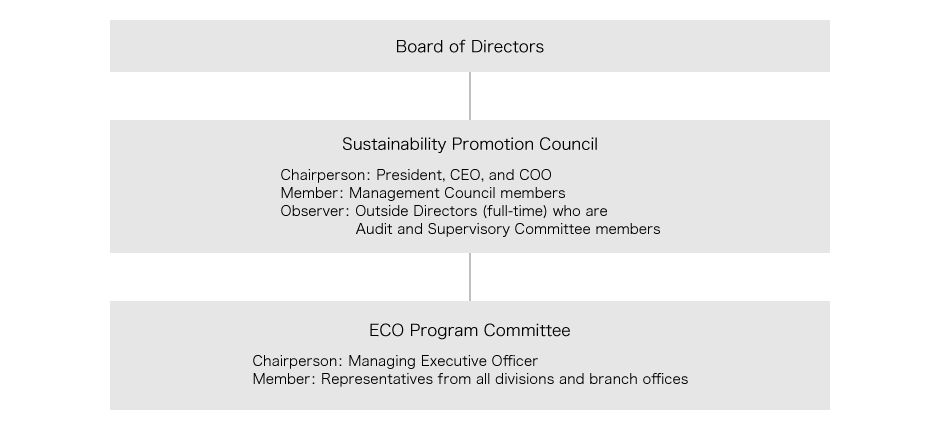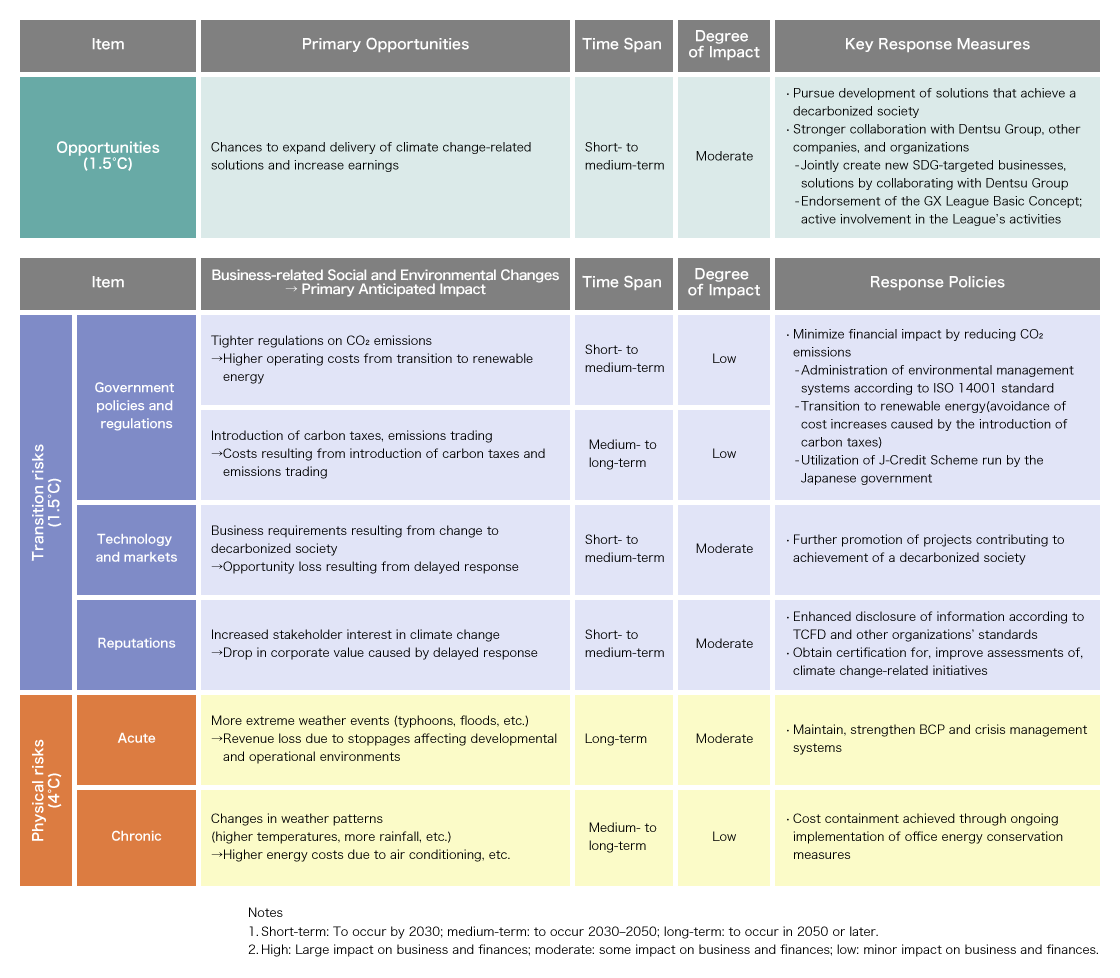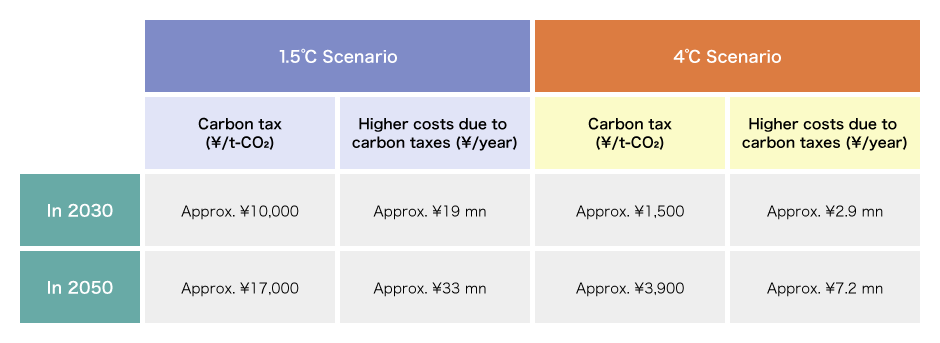TCFD
Disclosure Compliant with TCFD Recommendations
In September 2022, the DENTSU SOKEN Group declared its support for the Task Force on Climate-related Financial Disclosures (TCFD).
Our group also supports the Japanese government‘s declaration of achieving carbon neutrality by 2050 (announced in 2020) and its greenhouse gas emission reduction target in FY2030 (announced in 2021).
The Group’s information disclosures thus will reflect task force recommendations—concerning governance, risk management, strategy, metrics, and targets—as it continues contributing to the realization of a sustainable society and further enhancing its corporate value.
Governance and Risk Management
To ensure Group-wide implementation of sustainability-related initiatives, DENTSU SOKEN has set up the Sustainability Promotion Council. Chaired by the President, CEO and COO, it oversees a number of subordinate committees. Through the council we identify and investigate key sustainability issues that affect the entire Group, facilitate decisions regarding policies for addressing sustainability-related issues, and monitor the progress of efforts pertaining to sustainability.
The Council also supervises risk management within the DENTSU SOKEN Group, identifying the most significant risks (those deemed highly likely to have a substantial disruptive impact on business continuity); determining the departments responsible for managing specific risks; appointing individuals in charge of risk management-related operations; formulating risk response plans; and monitoring the progress of risk management efforts in general.
The Council also assesses the impact of significant climate change-related risks by conducting scenario-based analyses in accordance with TCFD recommendations. The Eco Program Committee, which is subordinate to the council, assumes responsibility for addressing these risks.
Click here for more information on risk management
DENTSU SOKEN established the Eco Program Committee as a body subordinate to the Sustainability Promotion Council. The committee focuses primarily on ensuring a response to various environmental issues, including climate change. The committee evaluates impacts associated with climate-related risks by conducting scenario analyses according to TCFD recommendations.
At least three times a year, DENTSU SOKEN’s Board of Directors receives reports from the Sustainability Promotion Council. Based on the content of the reports, the Board of Directors provides oversight for DENTSU SOKEN’s policies and action plans regarding climate change- and other sustainability-related issues. At the same time, the Board of Directors monitors the progress being made.

Strategy
The Group recognizes that its response to climate change is an important issue with medium- to long-term impact on its corporate value. Thus we see a need for flexible strategies that respond to changing circumstances—such as government policies and legislation, market conditions, and technologies—in all the countries in which we operate.
Reflecting this, we selected two scenarios (assuming warming of 1.5°C and 4°C*) according to which we have analyzed and assessed climate change-related opportunities and risks, using 2030 and 2050 as base years.
-
*To estimate the climate change-related impact we used two scenarios based on data from the Intergovernmental Panel on Climate Change (IPCC) and the International Energy Agency (IEA). One scenario assumed average warming of 1.5°C and the other of 4°C.

Key Opportunities and Risks

The results of these analyses indicate no significant financial impact under either scenario: neither from risks associated with the transition to a low-carbon society, nor from physical risks associated with shifts caused by climate change.
Meanwhile, we have concluded that the 1.5°C scenario would generate opportunities for the Group to expand its lineup of solutions and increase its earnings. Our findings show that the its business activities are both sustainable and resilient.
Key measures to capitalize on opportunities
We aim to uncover new technological possibilities that are generated through business opportunities associated with climate change response. To this end, we are collaborating with Dentsu Group companies, other corporations, and a range of organizations to develop and provide solutions that facilitate decarbonization, help create a circular economy, and support ESG management.
Further, DENTSU SOKEN endorses the GX League Basic Concept announced by the Ministry of Economy, Trade and Industry. The league is a forum of government, academic, and financial leaders, who are committed to green transformation (GX), and can discuss issues related to both the total transformation of socioeconomic systems and practical strategies for the creation of new markets. The Group will contribute to the efforts of the GX League.
(Examples of Major Initiatives)
Solutions contributing to resolving environmental issues:
Collaboration with the Dentsu Group, other companies and organizations:
Primary Risk Mitigation Measures
Our analyses indicate that climate change-related risk will have only a limited financial impact on the DENTSU SOKEN Group. Regardless, we will strive to further reduce climate change-related risk by ensuring that our environment management systems comply with the ISO 14001 standard. In short, we will increase the percentage of energy we obtain from renewable sources, and use carbon credits and other strategies to reduce our CO2 emissions. The greater portion of our Scope 1 and 2 CO2 emissions resulted from our use of electricity in our offices (Scope 2) because we do not have a datacenter.
The table below gives an estimate of the monetary impact on the Group were a carbon tax introduced in 2030 or 2050, under scenarios that assume average warming of 1.5°C and 4°C, and CO2 emissions that are the same as those observed in FY2021.

In addition, we will continue to ensure business continuity and mitigate risks associated with extreme weather events.
Metrics and Targets
We measure and manage opportunities and risks associated with climate change using CO2 emissions as an indicator, and aim to achieve carbon neutrality (in terms of Scope 1 and 2 CO2 DENTSU SOKEN Group-generated emissions) in FY2030.
While stepping up our disclosure of information concerning CO2 emissions and pursuing certifications and improved assessments for relevant initiatives, we will continue our efforts targeting the achievement of a sustainable society.
For information on the DENTSU SOKEN Group's environment-related performance data, see below:
